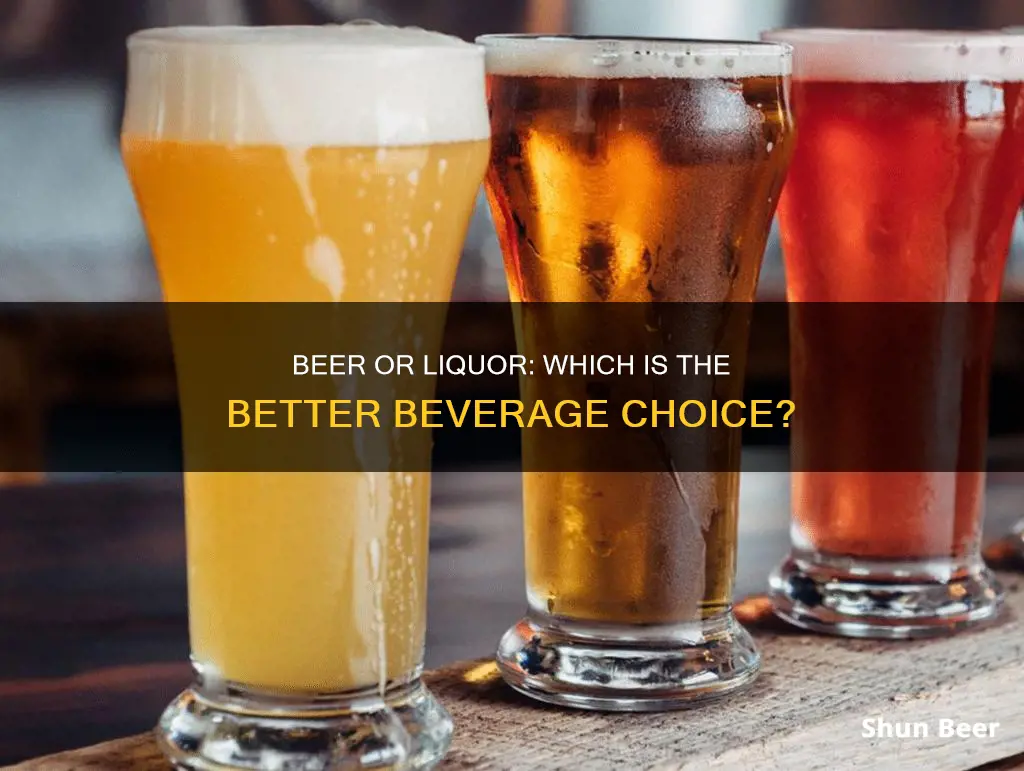
Beer before liquor, never been sicker; liquor before beer, you're in the clear is a well-known saying that has been passed down through generations. It is often used as a rule of thumb to avoid a hangover or getting sick while drinking. However, the saying is just a myth, and the order in which you drink beer or liquor has little impact on whether you will experience a hangover or not. The severity of a hangover depends on various factors, including dehydration, severe intoxication, and the total amount of alcohol consumed.
| Characteristics | Values |
|---|---|
| How to avoid a hangover | There is no evidence that drinking beer or liquor in a specific order can decrease the chances of getting a hangover. |
| Factors that can affect hangover symptoms | Amount of alcohol consumed, feelings of dehydration, severe intoxication, drinking on an empty stomach, vomiting, genetics, congeners (additives found in dark liquors), smoking |
| Beer | Slower rate of intoxication compared to liquor, lower alcohol by volume, more volume per serving |
| Liquor | Faster rate of intoxication compared to beer, higher alcohol by volume, smaller serving size |
What You'll Learn

Beer before liquor, never been sicker: myth or fact?
"Beer before liquor, never been sicker; liquor before beer, you're in the clear" is a well-known phrase with unknown origins. The saying refers to the idea that drinking beer before liquor can help you avoid a hangover.
There are several theories about how this saying came to be. One hypothesis is that people usually start their nights out with drinks that have lower alcohol content, such as beer, and then move on to liquor. So, if they get sick at the end of the night or feel terrible the next morning, they may assume it's because of the order in which they drank these beverages.
Another theory suggests that liquor's high alcohol content is more likely to spike your blood alcohol levels quickly compared to beer. Therefore, finishing the night with liquor after drinking beer can quickly increase your blood alcohol content, potentially leading to a hangover.
However, despite these elaborate theories, recent studies have shown that the order in which you drink different types of alcohol does not significantly impact the severity of a hangover. A 2019 study found little to no connection between the order of alcohol consumption and the likelihood or severity of hangovers.
Factors that have a more substantial impact on hangovers include dehydration, severe intoxication, and the total amount of alcohol consumed. Drinking on an empty stomach, genetics, congeners (additives in dark liquors), and smoking are also linked to more severe hangover symptoms.
So, while the saying "beer before liquor, never been sicker" has persisted for generations, the likelihood of getting a hangover has more to do with the amount you drink and other factors rather than the order in which you drink beer and liquor.
Germans and Their Unique Hot Beer Drinking Culture
You may want to see also

How much alcohol is too much?
The amount of alcohol that is considered "too much" depends on various factors, including gender, weight, and frequency of drinking. According to the National Institute on Alcohol Abuse and Alcoholism (NIAAA), the U.S. Dietary Guidelines recommend that healthy adults who choose to drink limit their intake to one drink or less per day for women and two drinks or less per day for men. These guidelines aim to reduce, but not eliminate, alcohol-related risks.
Exceeding these guidelines can lead to acute risks such as falls, burns, car crashes, memory blackouts, medication interactions, assaults, drownings, and overdose deaths. Additionally, drinking more than the recommended amount can result in chronic health problems, including liver disease, alcohol use disorder (AUD), and social harms like relationship issues.
It is important to note that there is no safe drinking level, and even low to moderate alcohol consumption has been linked to increased risks for stroke, cancer, and premature death. The less alcohol consumed, the better, as it reduces the likelihood of alcohol-related harm.
To put these guidelines into context, a "standard drink" in the United States is defined as any drink containing 14 grams or about 0.6 fluid ounces of "pure" ethanol. This amount is typically found in 12 ounces of regular beer (5% alcohol by volume), 5 ounces of table wine (12% alcohol by volume), or 1.5 ounces of 80-proof distilled spirits (40% alcohol by volume).
When it comes to the order of drinking beer or liquor, there is a common saying, "beer before liquor, never been sicker; liquor before beer, you're in the clear." However, recent studies suggest that the order of drinking different types of alcohol has little impact on hangover severity. Factors such as dehydration, severe intoxication, and the total amount of alcohol consumed play a more significant role in hangovers.
In summary, while there are general guidelines for alcohol consumption, it is important to remember that any amount of alcohol can be considered too much for certain individuals. It is always advisable to drink responsibly and in moderation to minimize potential health risks.
Beer Drinking: Weight Loss Friend or Foe?
You may want to see also

The effects of carbonation on alcohol absorption
A 2007 study found that 14 out of 21 participants absorbed alcohol faster when mixed with carbonated water, with the remaining participants showing no change or a decrease in absorption rate. The difference between the absorption rates was found to be statistically significant.
Another study, published in the American Journal of Clinical Nutrition in 2019, found that the order in which different types of alcohol are consumed does not affect the severity of a hangover. However, it is important to note that the study did not specifically investigate the effects of carbonation on alcohol absorption.
Factors that can affect the rate of alcohol absorption include the amount of alcohol consumed, the speed of consumption, and the presence of food in the stomach. The liver can only metabolize about one drink per hour, so consuming alcohol rapidly or in large amounts can lead to a faster rate of absorption and increased intoxication.
Additionally, carbonated beverages like beer can irritate the stomach lining, making you more sensitive to spirits consumed later and potentially contributing to hangover symptoms.
Ibuprofen and Beer: Is It Safe to Mix?
You may want to see also

The role of genetics in hangovers
Hangovers are an unpleasant reality for many people who drink alcohol, but the severity and occurrence of hangovers vary from person to person. Research has found that genetics plays a significant role in this variation. In fact, genetic factors can account for up to 45% of the difference in hangover frequency in men and 40% in women, with some studies suggesting that genes may account for up to 55% of the variability in hangovers.
This means that the reason one person experiences a hangover while another doesn't, even when they consume the same amount of alcohol, could be due to their genes. For example, people with certain gene variants are more likely to drink to the point of intoxication and experience more frequent hangovers. Additionally, those who are less susceptible to hangovers may have a higher risk for alcohol addiction.
While genetics plays a crucial role in hangover susceptibility, it's important to note that environmental factors also come into play. These can include things like how quickly a person drinks, whether they consume alcohol on an empty stomach, their overall health, and their tolerance for alcohol.
So, while your genes may predispose you to experiencing hangovers, the way you drink and other external factors can also impact the likelihood and severity of a hangover. Understanding the role of genetics in hangovers can help individuals make more informed decisions about their alcohol consumption and encourage them to drink in a way that minimizes negative consequences.
Breastfeeding and Beer: How Much is Too Much?
You may want to see also

Strategies for preventing hangovers
While there is no surefire way to prevent a hangover other than abstaining from drinking alcohol, there are some strategies that may help reduce the severity of hangover symptoms. Here are some tips to help prevent a hangover:
Stay Hydrated
Drinking alcohol can lead to dehydration, which can worsen hangover symptoms such as thirst, headache, and fatigue. It is important to drink water or other non-alcoholic beverages between alcoholic drinks to maintain hydration levels. Drinking water before going to bed and the next morning can also help.
Drink in Moderation
The amount of alcohol consumed is a significant factor in determining the severity of a hangover. To reduce the risk of a hangover, it is important to adhere to recommended alcohol consumption guidelines, such as limiting consumption to one drink per day for women and two drinks per day for men.
Choose Drinks Wisely
Some types of alcohol have higher levels of congeners, which are compounds produced during fermentation. These congeners can contribute to worse hangover symptoms. Clear liquors, such as vodka and gin, tend to cause hangovers less frequently than darker liquors, such as whiskey and red wine. Choosing drinks with lower alcohol content and fewer congeners may help reduce the risk of a hangover.
Prioritize Sleep
Alcohol can disrupt sleep patterns, leading to grogginess and fatigue the next day. Getting enough sleep after drinking can help reduce these effects. It is important to give yourself plenty of time to rest and recover after a night of drinking.
Eat a Hearty Breakfast
Hangovers are sometimes associated with low blood sugar levels, which can contribute to symptoms such as weakness and headache. Eating a nutritious breakfast or a late-night meal after drinking can help maintain blood sugar levels and mitigate some hangover symptoms.
Avoid Rounds
Drinking in rounds can make it more difficult to monitor alcohol consumption and drink in moderation. It is better to space out drinks and be mindful of how much alcohol is being consumed.
While these strategies may help reduce the severity of hangovers, it is important to remember that the best way to prevent a hangover is to drink in moderation or abstain from drinking alcohol altogether.
Beer and Diarrhea: Should You Drink or Ditch It?
You may want to see also
Frequently asked questions
It is recommended that you drink in moderation, regardless of whether you choose beer or liquor. If you're looking to get drunk, liquor will get you there faster.
No, it doesn't matter. The popular saying "beer before liquor, never been sicker; liquor before beer, you're in the clear" is a myth. The order in which you drink different types of alcohol does not affect the severity of a hangover.
The amount of alcohol consumed, feelings of dehydration, severe intoxication, drinking on an empty stomach, genetics, and congeners (additives found in dark liquors) are some of the factors that can influence the severity of a hangover.
To prevent a hangover, it is recommended to drink in moderation, eat while drinking, and stay hydrated. Drinking water or sports drinks can help maintain your body's fluid and electrolyte balance.
Beer has a lower alcohol by volume (ABV) compared to liquor, so drinking beer will get you drunk at a slower rate. Starting your night with beer and transitioning to liquor may help you pace yourself and avoid getting too drunk.







